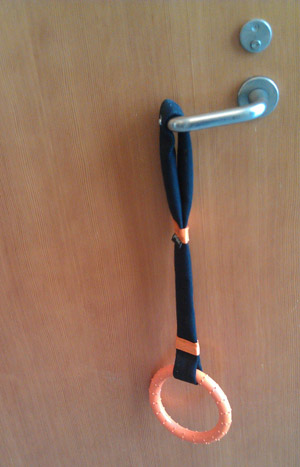Disability Resource Centre looks to build awareness about assistance dog etiquette

A dog pull on a classroom door.
Members of the campus community might have been noticing double sets of rings showing up on door handles on some accessible washrooms and classroom doors around campus since September. These rings help certified assistance dogs activate door handles and complete tasks they are trained to do.
Supporting students with disabilities with assistance dogs is new ground for the Disability Resource Centre (DRC), but the unit is committed to creating positive disability awareness at the Okanagan campus about accommodating students requiring assistance dogs such as the dog pulls.
“Assistance dogs, guide dogs and service animals provide critical tasks that increase the independence of students with disabilities on our campus. The DRC would like to help the campus community be more aware of the appropriate etiquette specific to assistance dogs,” says DRC Coordinator Jess Roebuck.
“An assistance dog counteracts many of the negative social responses to a disability — such as staring — by creating a focus other than the disability itself. With this reduction of focus on the disability comes a lessened psychological and social impact of being different that often comes with being disabled.”
The Guide Animal Act of British Columbia guarantees people with disabilities the right to be accompanied by their assistance dog in all areas open to the general public. At UBC’s Okanagan campus, this includes allowing an assistance dog and its handler the same access everyone else has on campus.
These assistance dogs are not regular dogs though — they are working dogs and need to be approached and treated differently.
The DRC has an extensive list of things to do, and not do, when interacting with an assistance dog and its handler. For example, campus community members are asked not to pet (or ask to pet) them, feed them, whistle or give them commands or training advice. Find out more by reading the DRC’s Faculty and Staff Tips for Assistance Dogs.
To find out more about this support to students with disabilities, contact Jess Roebuck.